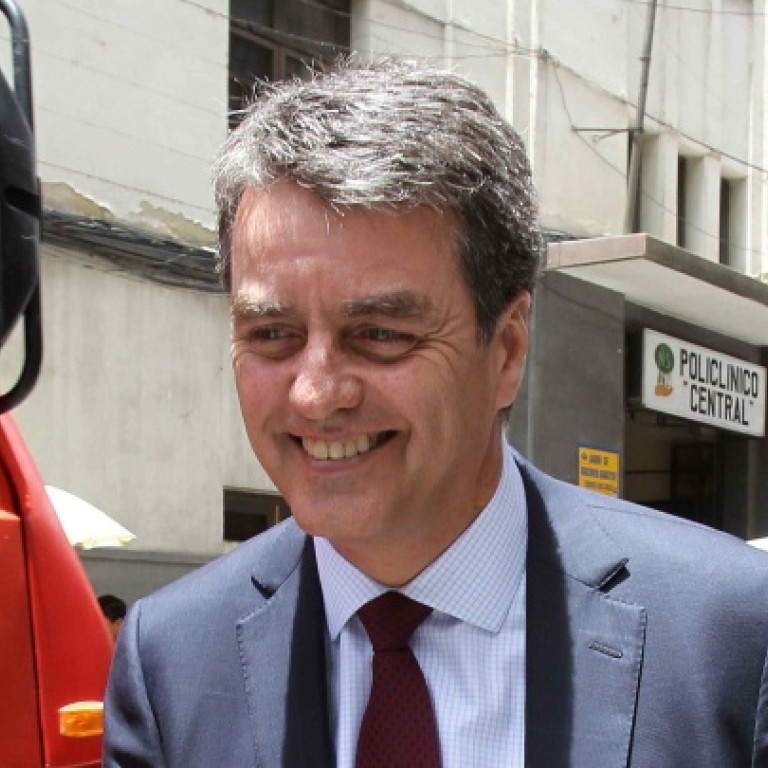
Brazil’s WTO job a sign of trade clout, hope for talks
As Brazilian Roberto Azevedo prepares to take the helm of the WTO, analysts say his victory in its leadership race is a clear sign of the clout of emerging nations.
He is also seen as a having the potential to revive stalled World Trade Organization talks which aim to harness global commerce to give a boost to developing countries.
Career diplomat Azevedo, who is Brazil’s WTO ambassador, is poised to be confirmed as the successor of Frenchman Pascal Lamy as director general of global commerce’s rule-setting body.
The WTO’s 159 member nations were set to meet at its Geneva base Wednesday to hear from diplomats running its leadership race that Azevedo had pipped veteran Mexican trade negotiator Herminio Blanco to the job.
Sources involved in the WTO’s leadership contest had revealed the news Tuesday, but the two men’s campaign teams and the trade body itself declined to comment before the upcoming meeting.
Observers underlined the importance of emerging giant Brazil winning.
“Both for symbolic and tactical reasons, this is a great choice,” said Kevin Gallagher of Boston University, an expert on globalisation and development.
The WTO does not hold elections, but picks its chief by consensus.
The head of its ruling General Council, Pakistan’s trade ambassador Shahid Bashir, had spent weeks along with his counterparts from Canada and Sweden gauging countries’ views on who was likely to muster the most support.
Lamy, a former trade chief of the European Union, steps down on September 1 after two four-year terms at the helm.
Azevedo will face the tough task of trying to breath life into the WTO’s stalled “Doha Round” of trade liberalisation talks, launched in 2001.
“Given that the WTO is a ‘one-country-one-vote’ institution, Western supporters figured that a deal endorsed by Brazil would spark the backing of BRICS and other emerging market and of developing countries,” said Gallagher.
“Brazil now must press the West to make sure that the first tact in any new round of trade talks eliminates distortionary policies in the industrialised world, like agricultural subsidies,” he added.
Speaking before Tuesday’s news emerged, Azevedo told AFP he was convinced he had the mettle to reboot the WTO.
“The multilateral trading system is weakened by a complete paralysis in the negotiations,” he said.
“It’s about making the system respond to the realities of today’s world... The only way to do this is to promote trade and trade liberalisation as an important component of development policies,” he added.
“We’re not going to do that unless we unclog the system,” he insisted, adding that a “modulation of the ambition” was needed to allow progress.
Azevedo’s rival final-round candidate Blanco is a 62-year-old economist with the reputation of a trade heavyweight.
He was Mexico’s negotiator for the 1994 North American Free Trade Agreement, served as a minister of commerce and also boasts solid private sector credentials.
He and Azevedo repeatedly flagged up their broad support across a range of nations and economic levels, from the poorest to the richest, and had pitched a similar vision for breaking the Doha deadlock.
But 55-year-old Azevedo’s insider status as an experienced negotiator and consensus-builder at the WTO appeared to have clinched the contest.
He has been Brazil’s WTO ambassador since 2008, making him well placed to navigate the system to try to clear the Doha logjam at a crunch summit in Bali in December.
“We admire his extensive experience and deep familiarity with international trade institutions and processes on behalf of Brazil and the focus he has placed on consensus-building in Geneva,” said Jake Colvin, vice-president of the US’ National Foreign Trade Council.
“The next head of the WTO faces two critical tasks in steering the membership toward a successful outcome to the ministerial conference this December in Indonesia and building consensus toward a broader agenda to modernize trade rules for the digital age,” he added.
The Doha Round, launched at a summit in Qatar in 2001, aims to open markets and remove trade barriers such as subsidies, excessive taxes and regulations, in order to harness international commerce to develop poorer economies.
But the concessions needed have sparked clashes notably between China, the EU, India and the United States.
As Brazil’s litigator, Azevedo locked horns with the European Union and United States over their subsidies for aircraft makers and cotton producers, although Brazil has also been accused of protectionism by trade partners.
“I’m not going to be there defending Brazilian interests or anything of the kind, or Brazilian trade policy,” as WTO chief, he told AFP recently.
